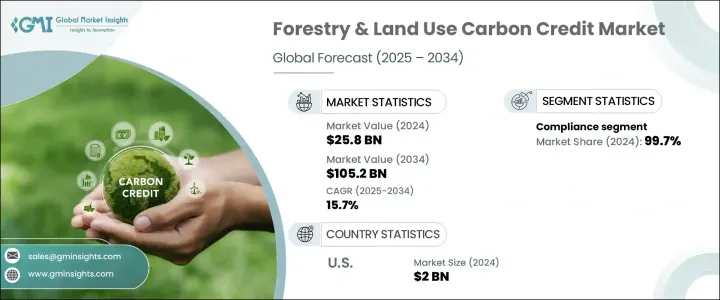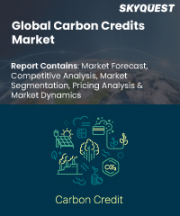
|
시장보고서
상품코드
1716517
산림 및 토지 이용 탄소 크레딧 시장 기회, 성장 촉진 요인, 산업 동향 분석, 예측(2025-2034년)Forestry and Land Use Carbon Credit Market Opportunity, Growth Drivers, Industry Trend Analysis, and Forecast 2025 - 2034 |
||||||
세계 산림 및 토지 이용 탄소 크레딧 시장은 2024년에 258억 달러로 평가되었으며, 2025년부터 2034년에 걸쳐 15.7%의 연평균 복합 성장률(CAGR)로 성장할 것으로 예측됩니다.
이러한 현저한 성장은 기후 변화 완화에 대한 세계 관심 증가와 온실가스 배출 감소를 위한 중요한 메커니즘으로 탄소 크레딧의 인지도 증가로 이어지고 있습니다. 각 산업이 세계 기후 변화 목표에 부합하도록 강한 압력을 받고 있는 가운데 탄소 크레딧은 지속 가능한 토지 관리 및 보전 활동의 인센티브로서 급속히 필수적이 되고 있습니다. 세계 정부, 기업 및 환경 단체는 배출량을 상쇄하고 탄소 중립 목표를 달성하기 위해 탄소 크레딧을 채택하고 있습니다. 이해관계자가 생물다양성의 보전, 환경회복, 장기적인 탄소 격리에 기여하는 프로젝트를 우선하는 가운데, 자연 기반 솔루션에 대한 사회적 인식과 투자자의 관심이 높아지고 있는 것도 수요를 더욱 뒷받침하고 있습니다. 기후 변화 완화 전략이 기세를 늘리고 있는 가운데,산림 및 토지 이용 탄소 크레딧 시장은 세계의 탈탄소화 노력의 중심 기둥이 될 것으로 예측됩니다.

이에 더해 습지대, 이탄지, 맹그로브 등의 중요한 생태계를 회복시키는 노력이 증가하고 있는 것도 시장의 성장을 뒷받침하고 있습니다. 장기간에 걸쳐 엄청난 양의 이산화탄소를 포착하고 축적합니다. 그 결과 조직은 이러한 경관의 보전과 복구를 특히 목적으로 한 탄소 크레딧 프로그램을 적극적으로 검토하고 숲 및 토지 이용 탄소 신용 서비스 수요를 높이고 있습니다. 산업계는 또한 진화하는 환경 규제에 맞추어 지속 가능한 토지 관리 전략을 채용해, 야심적인 배출 감축 목표를 달성하려고 하고 있습니다. 재협정과 같은 국제적 틀을 준수할 필요성이 증가함에 따라 기업은 환경과 경제의 지속가능성 모두에 기여하는 검증되고 투명한 탄소 신용 프로그램에 투자하게 되었습니다.
| 시장 범위 | |
|---|---|
| 시작 연도 | 2024년 |
| 예측 연도 | 2025-2034년 |
| 시작 금액 | 258억 달러 |
| 예측 금액 | 1,052억 달러 |
| CAGR | 15.7% |
리모트 센싱, 드론, 인공지능(AI), 머신러닝, 블록체인, 위성 이미지 등의 첨단 기술의 통합은 탄소 크레딧의 감시 및 검증 방법에 혁명을 가져왔습니다. 정확성과 효율성 향상은 산업계와 토지 소유자가 이러한 시장에 참가하기 쉽게 함으로써 보다 광범위한 도입을 촉진하고 시장의 성장을 뒷받침하고 있습니다.
산림 및 토지 이용 탄소 크레딧 시장은 임의 크레딧과 컴플라이언스 크레딧으로 구분됩니다. 정부는 엄격한 규제 프레임 워크 하에서 발행됩니다. 정부의 강력한 백업과 유리한 규제가 결합되어 조직이 엄격한 환경 기준을 달성하기 위해 노력하는 동안 컴플라이언스 분야는 계속 견인 역할을하고 있습니다.
미국의 산림 및 토지 이용 탄소 크레딧 시장은 2024년에 20억 달러를 창출했습니다. 이러한 성장은 주로 국가의 산업 활동 증가, 탄소 배출량 증가에 대한 우려 고조, 에너지 수요 급증에 의해 주도됩니다. 규제 프레임워크가 강화되고 지속가능성에 대한 관심이 높아짐에 따라 기업이 국가와 세계의 기후 변화에 관한 공약을 달성하려고 노력하고 있기 때문에 시장은 상승 기조를 유지할 것으로 예측됩니다.
목차
제1장 조사 방법과 조사 범위
제2장 주요 요약
제3장 업계 인사이트
- 업계 에코시스템
- 규제 상황
- 업계에 미치는 영향요인
- 성장 촉진요인
- 업계의 잠재적 위험 및 과제
- 성장 가능성 분석
- Porter's Five Forces 분석
- PESTEL 분석
제4장 경쟁 구도
- 소개
- 전략 대시보드
- 혁신과 지속가능성의 전망
제5장 시장 규모와 예측 : 유형별, 2021년-2034년
- 주요 동향
- 자원봉사
- 컴플라이언스
제6장 시장 규모와 예측 : 지역별, 2021-2034년
- 주요 동향
- 북미
- 유럽
- 아시아태평양
- 중동 및 아프리카
- 라틴아메리카
제7장 기업 프로파일
- 3Degrees
- ALLCOT
- Atmosfair
- CarbonClear
- Climate Impact Partners
- ClimeCo LLC.
- EcoAct
- Ecosecurities
- Green Mountain Energy Company
- PwC
- South Pole
- Sterling Planet Inc.
- TerraPass
- The Carbon Collective Company
- The Carbon Trust
- VERRA
- WGL Holdings, Inc.
The Global Forestry & Land Use Carbon Credit Market was valued at USD 25.8 billion in 2024 and is projected to expand at a robust CAGR of 15.7% between 2025 and 2034. This significant growth is driven by the surging global focus on climate change mitigation and the increasing recognition of carbon credits as a crucial mechanism for reducing greenhouse gas emissions. As industries across sectors face mounting pressure to align with global climate goals, carbon credits are quickly becoming indispensable in incentivizing sustainable land management and conservation practices. Governments, corporations, and environmental organizations worldwide are embracing carbon credits to offset emissions and achieve carbon neutrality targets. The demand is further fueled by growing public awareness and investor interest in nature-based solutions, as stakeholders prioritize projects that contribute to biodiversity conservation, environmental restoration, and long-term carbon sequestration. With climate change mitigation strategies gaining momentum, the forestry & land use carbon credit market is set to become a central pillar in global decarbonization efforts.

In addition to this, increasing initiatives to restore critical ecosystems such as wetlands, peatlands, and mangroves are also fueling market growth. These ecosystems play a vital role in natural carbon sequestration, capturing and storing vast amounts of carbon dioxide over extended periods. As a result, organizations are actively exploring carbon credit programs specifically aimed at preserving and rehabilitating these landscapes, thereby elevating the demand for forestry and land use carbon credit services. Industries are also adopting sustainable land management strategies to align with evolving environmental regulations and meet ambitious emission reduction goals. The rising need to offset emissions and comply with international frameworks like the Paris Agreement is prompting companies to invest in verified and transparent carbon credit programs that contribute to both environmental and economic sustainability.
| Market Scope | |
|---|---|
| Start Year | 2024 |
| Forecast Year | 2025-2034 |
| Start Value | $25.8 Billion |
| Forecast Value | $105.2 Billion |
| CAGR | 15.7% |
The integration of advanced technologies such as remote sensing, drones, artificial intelligence (AI), machine learning, blockchain, and satellite imagery is revolutionizing the way carbon credits are monitored and verified. These innovations are streamlining the process of tracking emissions reductions and ensuring the integrity of carbon credit programs. Enhanced accuracy and efficiency in carbon capture validation are making it easier for industries and landowners to participate in these markets, thereby encouraging wider adoption and boosting market growth. As digital technologies continue to evolve, they are expected to play a critical role in strengthening transparency, reducing verification costs, and improving the overall scalability of carbon credit systems.
The forestry & land use carbon credit market is segmented into voluntary and compliance credits. In 2024, the compliance carbon credits segment dominated the market, accounting for a massive 99.7% share. These credits are issued under strict regulatory frameworks established by government agencies or international organizations to ensure that industries comply with mandated emission reduction targets. Strong governmental backing, coupled with favorable regulations, continues to drive the compliance segment as organizations work toward meeting stringent environmental standards.
United States Forestry & Land Use Carbon Credit Market generated USD 2 billion in 2024. The growth is primarily driven by the country's increasing industrial activities, heightened concerns over rising carbon emissions, and soaring energy demands. With stricter regulatory frameworks and an intensified focus on sustainability, the U.S. market is expected to maintain its upward trajectory as businesses strive to meet national and global climate commitments.
Table of Contents
Chapter 1 Methodology & Scope
- 1.1 Market definitions
- 1.2 Base estimates & calculations
- 1.3 Forecast calculation
- 1.4 Primary research & validation
- 1.4.1 Primary sources
- 1.4.2 Data mining sources
- 1.5 Market definitions
Chapter 2 Executive Summary
- 2.1 Industry synopsis, 2021 – 2034
Chapter 3 Industry Insights
- 3.1 Industry ecosystem
- 3.2 Regulatory landscape
- 3.3 Industry impact forces
- 3.3.1 Growth drivers
- 3.3.2 Industry pitfalls & challenges
- 3.4 Growth potential analysis
- 3.5 Porter's analysis
- 3.5.1 Bargaining power of suppliers
- 3.5.2 Bargaining power of buyers
- 3.5.3 Threat of new entrants
- 3.5.4 Threat of substitutes
- 3.6 PESTEL analysis
Chapter 4 Competitive landscape, 2024
- 4.1 Introduction
- 4.2 Strategic dashboard
- 4.3 Innovation & sustainability landscape
Chapter 5 Market Size and Forecast, By Type, 2021 – 2034 (USD Billion)
- 5.1 Key trends
- 5.2 Voluntary
- 5.3 Compliance
Chapter 6 Market Size and Forecast, By Region, 2021 – 2034 (USD Billion)
- 6.1 Key trends
- 6.2 North America
- 6.3 Europe
- 6.4 Asia Pacific
- 6.5 Middle East & Africa
- 6.6 Latin America
Chapter 7 Company Profiles
- 7.1 3Degrees
- 7.2 ALLCOT
- 7.3 Atmosfair
- 7.4 CarbonClear
- 7.5 Climate Impact Partners
- 7.6 ClimeCo LLC.
- 7.7 EcoAct
- 7.8 Ecosecurities
- 7.9 Green Mountain Energy Company
- 7.10 PwC
- 7.11 South Pole
- 7.12 Sterling Planet Inc.
- 7.13 TerraPass
- 7.14 The Carbon Collective Company
- 7.15 The Carbon Trust
- 7.16 VERRA
- 7.17 WGL Holdings, Inc.



















